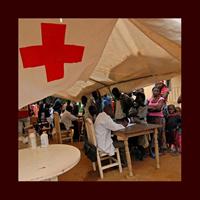Chad: Thirty years of helping the victims of armed violence

Today, 8 May, the delegation of the International Committee of the Red Cross (ICRC) in Chad is celebrating not only World Red Cross and Red Crescent Day but also the 30th anniversary of its humanitarian work in the country.
The ICRC established a full-time presence in Chad in 1978 to meet needs arising from the armed conflict between the government and the National Liberation Front of Chad. Between 1978 and 1982, ICRC staff working in Faya-Largeau, Bardaï, Abéché, N’Djamena and Moundou assisted thousands of victims of the armed conflicts and other violent situations that affected the country.
“It’s gratifying that even 30 years on, we still come across ex-detainees who well remember delegates visiting them in 1979, and people who received medical care from the ICRC at the height of the fighting in N’Djamena,” says Thomas Merkelbach, head of the organization’s delegation in N’Djamena.
The ICRC worked in Chad for a number of years, adapting its activities as the situation improved. In 1997, management of its operations in Chad was transferred to the organization’s regional delegation in Yaoundé, Cameroon.
However, the situation in eastern Chad began to worsen in 2003 and the ICRC required a more regular presence in the country to be able to assess the situation of the civilian population and respond to its needs where necessary. The organization therefore reopened its delegation in N’Djamena and now has a sub-delegation in Abéché and seven operational bases from which it carries out activities across the whole country.
To mark the 30th anniversary, the ICRC delegation in N’Djamena has organized an exhibition of photographs which tell the story of its operations in Chad since 1978.
“The exhibition will run from 8 to 15 May. It is above all an opportunity for us to show what has been accomplished with and for the people of Chad over the years, in both good times and bad,” said Stéphane Beytrison, head of the sub-delegation in Abéché. “In the 1980s, our work primarily involved helping detainees and civilian internees and responding to emergencies such as the fighting in N’Djamena. Since 2003, however, we have also had to deal with the long-term consequences of displacement caused by the poor security conditions in several regions of eastern Chad. This is not something that makes the headlines, but it has a major impact on daily living and threatens the future of several thousand Chadian men, women and children.”
The ICRC would also like to take this opportunity to express its solidarity with the family and colleagues of Pascal Marlinge, country director of Save the Children UK in Chad, who was murdered on 1 May 2008 in eastern Chad, on the road between Farchana and Adré. This killing is one of many that have shocked and saddened the humanitarian community here in recent years.
The ICRC engages in bilateral dialogue with all parties to the conflict to remind them of the need to spare civilians from the consequences of armed conflict.
 Back and Next - Back and Next
Back and Next - Back and Next See Also - See Also
See Also - See Also